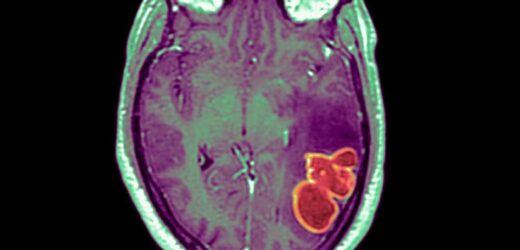THE number of children suffering from a potentially deadly brain infection has risen dramatically over the last few years.
In the United States alone, there was a 200 per cent increase in cases of abscesses in December 2022 following a surge in respiratory infections over the winter.
The peak saw 102 infections across the country – almost double the baseline maximum of 61 per month.
Cases remained above the threshold up to and including March 2023, the latest data available shows.
However, the Centers for Disease Control and Prevention said that even with the increase, the condition remains extremely rare.
Brain abscesses are pus-filled pockets caused by bacteria or fungi.
READ MORE HEALTH NEWS
Warning as deadly Victorian disease ‘set to overtake Covid as biggest killer’
I’m a dermatologist – 3 skin rashes that show creatures are living on your skin
They enter the brain through the bloodstream from an infection in another part of the body, like pneumonia in the lungs.
When identified early, they can be treated with antibiotics, but the condition exerts pressure on the brain tissue and can cut off blood flow so they can be fatal.
A CDC report led by epidemiologist Emma Accorsi analysed data from 37 children's hospitals in 19 states and Washington DC to count the number of abscesses in patients under the age of 18 since 2016.
They determined that between 2016 and 2019, the average monthly number of brain abscesses in children was about 34, peaking at 61 in a single month.
Most read in Health
The sign of deadly Victorian disease you can spot at night – 5 other symptoms
Most common day to suffer a serious heart attack revealed – are you at risk?
Urgent warning as porn addiction cases 'DOUBLE in a year' – the signs revealed
I'm a dietitian – here's 5 foods that help lower dangerously high blood pressure
When Covid hit, cases fell in line with other infections like respiratory syncytial virus and flu.
But once restrictions lifted in the summer of 2021, numbers for all three shot back up.
Then, in December 2022, following a marked rise in other respiratory illnesses, brain abscess cases hit a high of 102 – a 200 per cent rise on the pre-pandemic midpoint.
The numbers dipped in January, February and March 2023, but remained above the pre-Covid monthly maximum.
Accorsi and her team said: "This analysis in a large, geographically diverse network of children’s hospitals showed elevations in paediatric intracranial infections beginning in mid-2021 with a large spike in winter 2022–2023, both nationally and by US Census Bureau region."
Experts don't fully understand why cases have risen, but some blame the prevalence of other respiratory conditions.
A second report, which looked at a cluster of cases in southern Nevada, considered a potential link to mask-wearing rules being scrapped.
The CDC said it will continue to monitor brain abscesses and doctors will remain vigilant for symptoms among kids.
These include:
- Headaches (often severe, located in a single area and cannot be relieved with painkillers)
- Changes in mental state (confusion or irritability)
- Problems with nerve function (muscle weakness, slurred speech or paralysis on one side of the body)
- A high temperature
- Seizures
- Feeling sick
- Vomiting
- A stiff neck
- Changes in vision (blurring, greying or double)
Read More on The Sun
This Morning fans say the same thing after Holly Willoughby’s emotional statement
I put up a privacy fence to block out my neighbours but they’vesabotaged it
Accorsi also recommended all under-18s ensure they are up-to-date with recommended vaccines, including flu and Covid.
The new investigations were published in the CDC’s Morbidity and Mortality Weekly Report on June 2.
What is a brain abscess?
A BRAIN abscess is a pus-filled swelling in the brain.
It usually occurs when bacteria or fungi enter the brain tissue after an infection or severe head injury.
Although the risk of developing a brain abscess is extremely low in England, it is a life-threatening condition and should be diagnosed and treated as soon as possible.
This is because it exerts pressure on the brain tissue and can cut off blood flow.
Symptoms of abscesses include:
- Headaches (often severe, located in a single area and cannot be relieved with painkillers)
- Changes in mental state (confusion or irritability)
- Problems with nerve function (muscle weakness, slurred speech or paralysis on one side of the body)
- A high temperature
- Seizures
- Feeling sick
- Vomiting
- A stiff neck
- Changes in vision (blurring, greying or double)
If you or someone you know experiences any signs that suggest a problem with the brain and nervous system, you should call 999.
There are three main causes of abscess. These are:
- An infection in another part of the skull (e.g. ear infection, sinusitis or dental abscess)
- An infection in another part of the body (e.g. pneumonia that spreads via the blood)
- Trauma (e.g. a head injury that cracks open the skull)
The condition is diagnosed based on your symptoms, medical history, blood tests and scans.
It is usually treated with medication and surgery.
Source: Read Full Article










